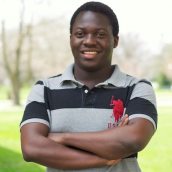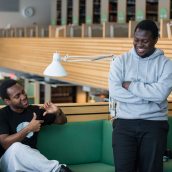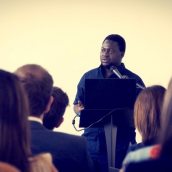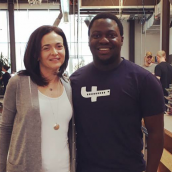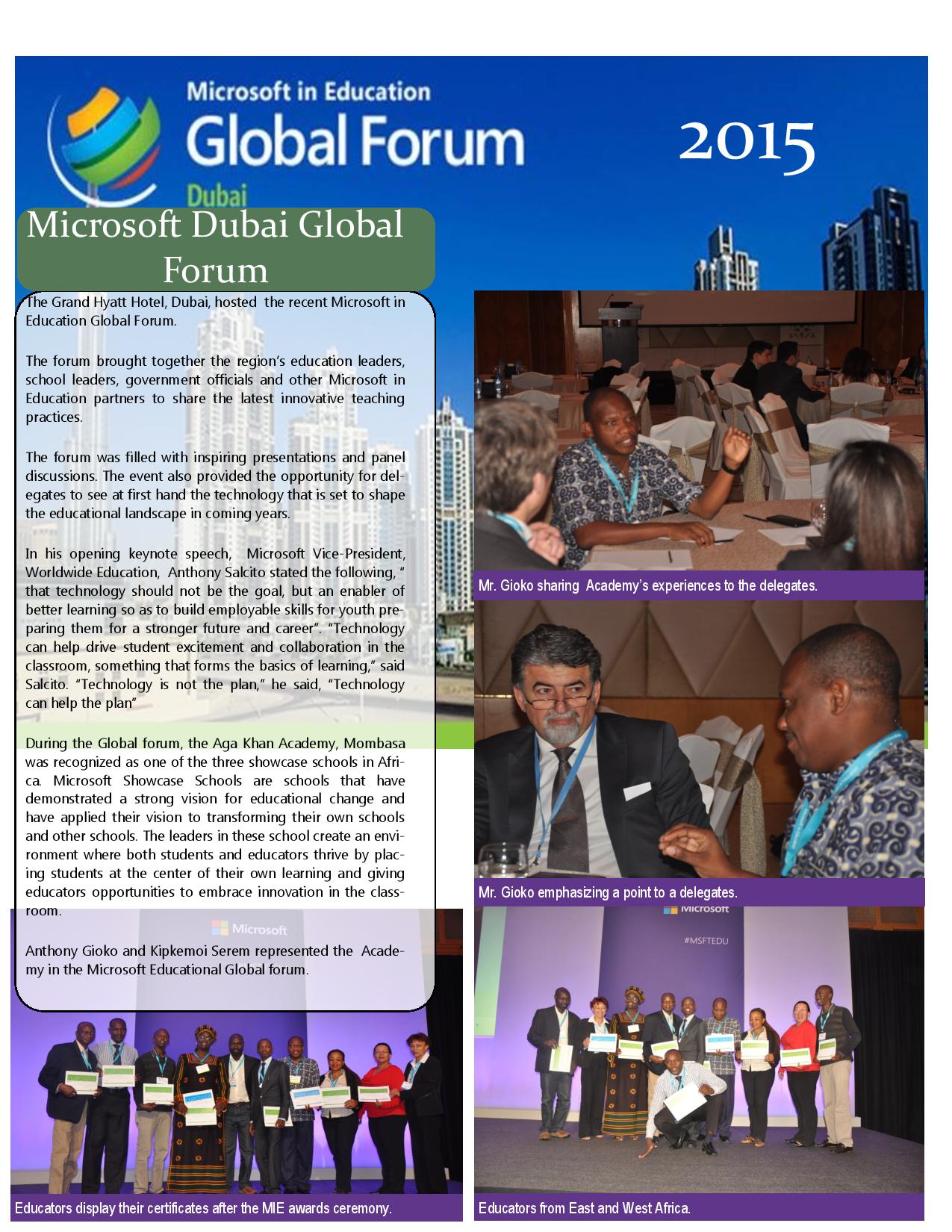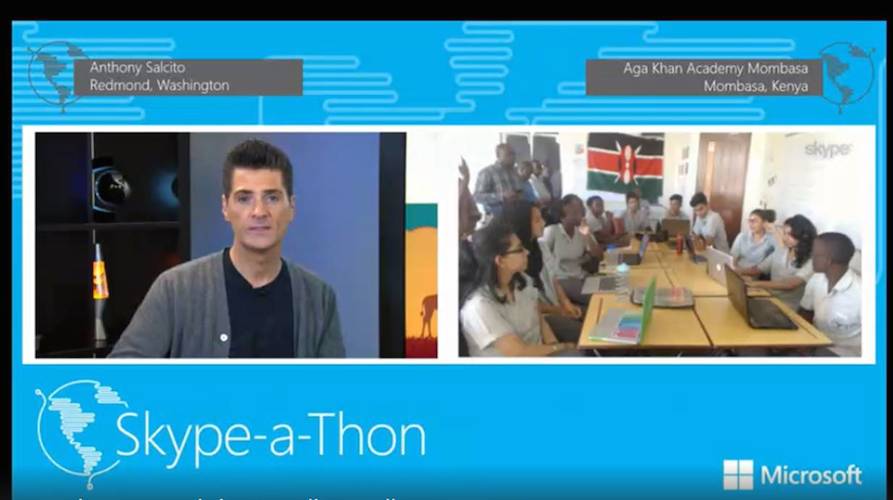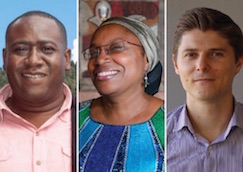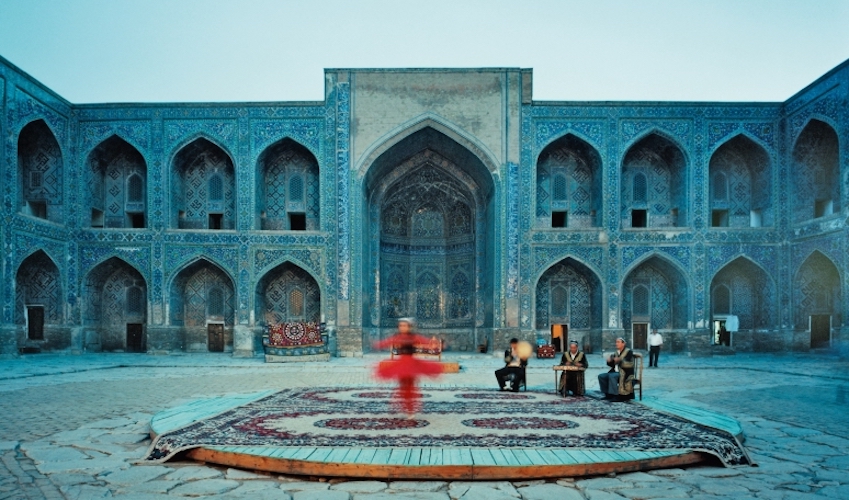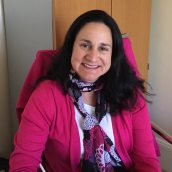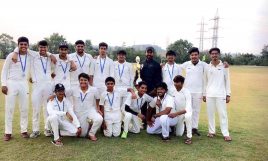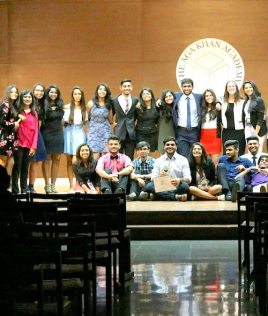MYP Personal Project Exhibition – 10am to 2pm, Saturday 19th January 2019
80 grade 10 students will showcase their personal projects at our annual exhibition, demonstrating innovation in global contexts. All faculty, admin staff and parents welcome!
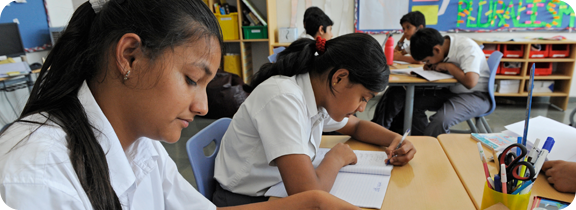
Academic Programme
The academic programme of the Aga Khan Academies is both comprehensive and rigorous. It encompasses formal academics as well as global themes (curriculum strands) that are designed to give students the skills to lead in their fields globally and locally.
The Academies' academic programme is organised according to the framework and principles of the globally renowned International Baccalaureate.
The academic curriculum is designed to ensure that students' theoretical learning is linked to relevant local and international issues through the focus on the Aga Khan Curricular Strands. Through this process, students are able to develop their understanding of the world alongside analytical skills, an ability to learn independently and the desire to make a difference.
The Academies are in the process of putting in place their dual language programme where English and a national language will both be languages of instruction in the Junior School. The aim is for students throughout the school to be at least bilingual.
Additionally, the programme is designed to equip students with the appropriate technical skills, so they have the opportunity to explore how technology is shaping communities.
Through an active, student-centred approach focused on mastery, the academic programme – along with co-curricular programmes – gives students the skills and ability to pursue a competitive, high-quality, post-secondary education. They are able to become thoughtful, curious, ethical and community-oriented leaders who are prepared to take on the challenges of a complex and interdependent world.
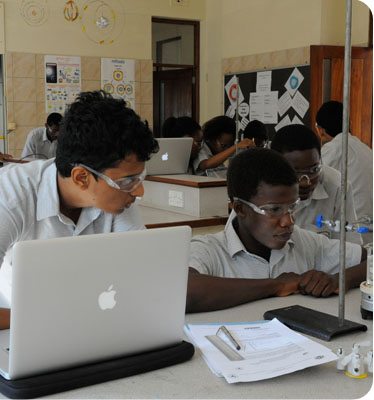
Ham Serunjogi: Blazing a path across three continents
Look below for a video of Ham talking about his experience at the Academy.
Swimming from Uganda
Ham Serunjogi, age 23, grew up in Uganda and started swimming competitively at age 6. His parents encouraged his academics and his athletics, and Ham excelled in both. In 2010 he enrolled at the Aga Khan Academy in Mombasa, Kenya.
On his way to Kenya, he competed in the Youth Olympics in Singapore in 2010. At AKA Mombasa, he trained and studied hard, learning leadership and teamwork. He became president of the AKA Student Representative Council. At the Academy he became fascinated by digital communication. In 2011 he conducted a school project back home in Uganda, where he interviewed the IT manager at Cineplex Uganda.
To America
Ham’s drive got the attention of educators. After graduating from the Aga Khan Academy he received a scholarship to study in the United States. He pursued a bachelor’s degree at Grinnell College, where he majored in Economics.
With a fellow Grinnell student, Ham developed an app that allowed users to send short, encrypted voice recordings that would self-destruct after they were played. It was a smart solution that anticipated the rise of privacy concerns in technology. The app could work in places where voicemail systems weren’t common, like Ghana, where his app partner grew up.
The habits cultivated at AKA continued to bear fruit, he says. “The education I gained at the Academy had an emphasis on critical thinking,” Ham explains. That critical ability for problem solving fueled his achievement at Grinnell, along with a conviction that he had something to contribute.
Taking New Ideas to Facebook in Europe
As he prepared to graduate from Grinnell, Ham let himself dream big. He set his sights on the biggest social media giant he could find. “I took an unorthodox approach,” Ham said of his strategy for getting a job. “Instead of applying online, I sent an email directly to Sheryl Sandberg.”
He received responses to his email within hours, urging him to apply online. Soon recruiters were calling to set up interviews. The interviews led to an internship on Facebook’s Global Accounts Team in New York during the summer of 2015, before his final year of study at Grinnell College. There he enjoyed a surprising degree of autonomy to tackle issues that he cared about. In his first weekly one-on-one with his supervisor, she asked him, “What are you most passionate about?” He took that as encouragement and created a new initiative.
Ham is amazed by where life has taken him.
Keeping up Connections and Giving Back
Again and again, Ham has drawn on his experiences from AKA Mombasa, and the bonds among his Academy friends remain strong. Before starting his new job in Ireland, he visited friends and family in Uganda. He still connects often with his AKA Mombasa roommate, Aleem Mawji, now a student at the University of British Columbia. Ham’s friend from the AKA swim team, fellow Ugandan Joshua Tibatemwa, followed his path as a AKA swim team star and student president. Joshua also followed Ham’s example to Grinnell, where he’s now a student. Joshua competed for Uganda at the Rio Olympics last summer.
Ham took time away from settling into Dublin life to watch the Olympics on television, hoping to catch a glimpse of his friend.
Ham has launched into a life of active engagement, creating networks that make people’s lives better. He has seen how such networks make a difference. He shows dedication to paying it forward.
This spotlight is republished courtesy of AKF USA.
Theresa Urist: A passion for education
An Interview with Theresa Urist, Global Director of University Counselling at the Aga Khan Academies
Theresa Urist has always loved to learn. Growing up in a rural community in New York state, where many of her classmates did not go on to college, her thirst for education led her to Stanford, where she earned a B.A. with Honours in American Studies and tutored high school students in her spare time. She realised that she loved teaching as much as she loved to learn, so she secured a spot in the Master of Education programme at Harvard University before becoming a high school teacher and, later, a university counsellor.After more than two decades as a counsellor in the United States, where she directed college counselling at three different schools, Theresa’s desire to support students from poor communities led her to the Aga Khan Academies, where she became the Global Director of University Counselling in 2015. Her role is essential to the mission of the Academies, which aim to produce effective, ethical leaders with the skills and knowledge to support positive development in their societies. As the networks’ university expert, she coordinates the university counselling process so that the students are admitted to and select universities where they will flourish in their chosen fields.
Aga Khan Academies writer Alia Dharssi sat down for a conversation with Theresa about her passion for education, her work at the Academies and what makes her tick. Their conversation has been edited for clarity and length.
Alia: Can you tell me about yourself and how you wound up becoming a university counsellor?
Theresa: I was born and raised in a very small town on Long Island in New York State. I wanted to be a journalist as a kid and wound up writing for my college daily newspaper, where I had a 1am news deadline. It was crazy and frenetic. I realised that’s not what I wanted to do, but I had also begun tutoring at a nearby school and I really, really loved working with the students. That experience put me in the direction of education. I earned a Masters of Education from Harvard and became an English and history teacher. In 1995, I answered the call to become an interviewer for Harvard undergraduate admissions. I loved talking to students about their future plans and goals during the interviews, so I put the pieces together and entered the field of university counselling.
Alia: What makes you passionate about education?
Theresa: The way I see it, education is the key to social mobility. When students – like the ones on full financial aid at the Academies who are selected through our talent identification programme – become educated, it’s something that doesn’t just benefit them. It benefits their family and their community and has a ripple effect. I see it as a way that entire communities can get themselves out of poverty in one generation. Education is the most concentrated way you can effect lasting social change. That’s what gets me up in the morning every single day to do the work that I do.
Alia: Have you always thought about education in this way?
Theresa: Education is always something that has been at the forefront of my mind. My parents were well educated, but I grew up in a very rural community where a lot of people had not studied beyond the secondary level. So, when I went off to university at Stanford 3,000 miles away from home, it was an eye-opening experience. I was surrounded by very motivated people with a lot of interesting ideas. I had been a big fish in a little pond in my secondary school because I was somebody who was very hungry for education. I tried to access a lot of educational opportunities despite the fact that I attended a regional, rural public high school that did not offer the most enriching academic experience. College was the first time in my life I was surrounded by students who had had very different life experiences, who had gone to schools that were very academically rigorous, who were incredibly curious. It was vibrant and transformative.
Alia: That sounds like an amazing experience. You started working at the Academies after two decades of working as a counsellor in the US. What inspired you to take the job?
Theresa: When I heard about the job, it seemed like a perfect fusion of my interests. The mission of the Academies in terms of providing educational opportunities for students regardless of their means is one that spoke to my heart. In two decades of counselling, I had gone from working in college prep, private schools to working at an urban public school with very low-income students. There are so many talented kids whose socioeconomic background prevents them from accessing very good academic opportunities in places where they’re going to flourish. And so, in my own job search, I was looking for an organisation that provided such opportunities for students in need. I was also interested in international education – in addition to being a US citizen, I’m also a Swiss citizen and I’ve spent a good amount of time overseas – so this position really spoke to me.
Alia: What kinds of struggles have you seen students from poor socioeconomic backgrounds face when it comes to getting a good education?
Theresa: In my last role in the US, I was working in an urban public charter school with low-income students from all over the world. The majority of my students were first generation, meaning their parents had immigrated to the US. They did not speak English at home and they would be the first in their families to access higher education. I helped them navigate the system. Many of their families came from countries where poverty was a problem. Just getting to the US was a big hurdle. In addition, education is very, very expensive in the US, so it was a challenge for those students to figure out how to finance their education.
Alia: That sounds quite different from your role at the Academy. How do the two experiences compare?
Theresa: I certainly have a lengthy background in university counselling, but when I was based in one single school, it was quite limiting in a lot of ways. My work at the Academies requires a much larger scope in terms of finding what universities are a best fit for particular students. I had good working knowledge of US and Canadian schools coming in. What’s newer for me is some of the other schools beyond that, particularly schools in the UK. It’s given me a greater global perspective on education in terms of the different programmes that exist and the ways in which universities are trying to position themselves globally.
Alia: Can you tell me about your trips to the Academies? What was your first impression?
Theresa: My first visit was to Hyderabad. I found the students compelling and the facilities stunning. Everything exists in the service of students and forwarding their academic and personal growth. When I first made a visit to the Mombasa school, I found the level of arts that students were doing and the level of introspection that went into what they were creating was incredibly deep and heartfelt. It was more advanced than what I’d seen at other schools. A lot of the students’ art projects dealt with issues of social justice and presented very clear messages that made me hopeful. Seeing that level of attention given to something that is often peripheral at other schools speaks volumes about the Academies.
Alia: Absolutely. Why is your role important to the Academies’ vision?
Theresa: As we grow as a network, we want to make sure we are offering a consistent quality of university counselling services across campuses, so that’s a really important part of my work. We want colleges and universities across the globe to know who we are and why they should admit our students and fund them, so a big part of my job is conducting outreach to universities and colleges. When a university takes a risk on a student and that student does well, then it knows that it has a viable academic candidate and will admit more and more students from our schools. My job is to try to create pipelines for students at academically rigorous universities that recognise who we are and why our students are so interesting and compelling.
I also conduct some professional development like workshops for faculty members where they receive training about best practices for writing recommendations for students. Both campuses are now on the Naviance platform, which is an online portal that allows students to track all their applications and send documents to universities electronically. We also track data on the admissions process on the platform.
Alia: That’s important work, but now for a less serious question. What do you do when you’re not busy counselling?
Theresa: I love to cook and bake. In particular, I like making fancy cakes and tortes. Every year, during the holidays, I create a gingerbread house. They’re not basic ones; I have architectural plans. Last year, I made a church with candy stained glass windows. The year before, it was a Victorian house. Every year I do a different structure.
Alia: That’s quite a hobby. Do you eat the houses?
Theresa: Yes, eventually I do. My friend’s kids help me decorate the house, it stays up and then it gets destroyed. So that’s one of my hobbies. To balance my baking interests, I was a distance runner and had run a bunch of marathons, but I had to stop after an injury. But I still really like to be active. I like hiking and skiing and being outside.
Alia: Is there anything else you’d like to say?
Theresa: I love the work I do. I feel like mine is a really important role, so I’m just very grateful for the opportunity to work on behalf of the Academies.
Kelvin Bagthariya: Generating positive change with resilience
Kelvin Bagthariya, a second-year Diploma student at the Aga Khan Academy Hyderabad, believes that his time at the Academy has taught him one thing in particular: resilience. Kelvin joined the Academy in year 9, and having come from a small town in Gujarat, it was a completely different environment. He believes the Academy has changed his mindset, teaching him to become independent, improving his self-esteem and allowing him to pursue his passion to make a change in his community.
“It was hard for me in the ninth grade as I grew up in a conservative society where people had closed mentalities and viewed life with confined perspectives – it was totally opposite when I came [to the Academy]. I was surrounded by people from diverse communities, with different perceptions and different approaches towards learning. Coming here to the Academy made me adapt to the pluralistic environment, helped me overcome new challenges and integrate [His Highness’s] vision towards my learning.”
For Kelvin, the attitude and assistance of the staff, teachers and his peers at the Academy were the reasons behind his resilience through this tough transition, especially in adjusting to a new way of learning and thinking. They were extremely encouraging towards Kelvin, which empowered him to take responsibility, get involved in enrichment activities and take on leadership roles.
“The journey has [inspired] many transformations in me since I joined. If I recall my first day [at the Academy], everything was new to me. I felt I wouldn’t be comfortable or accepted, and the first few months were lonely. But what the Academy has taught me is that you have to be independent. The Academy offers various opportunities from sports, service projects and various events. …Throughout my journey, being part of the school cricket team, participating and leading various service projects, being head of logistics in Model United Nations, summer internships, school trips and participating in cultural events has shaped me as an individual. It is very different from other schools. The journey wasn’t easy and couldn’t have been possible without my peers, teachers and assistance staff. After four years, if I look at myself, it is a proud moment for me.”
During his four years at the Academy, Kelvin has particularly enjoyed being part of the cricket team, Model United Nations, initiating the organic farming project at the Academy and doing a summer internship with the Aga Khan Foundation. Kelvin explains, “Enrichment activities give you a taste of real life and how it works.”
Through these enrichment activities and involvement in the community at the Academy, Kelvin was encouraged to contribute to the community in his hometown. “I am very passionate about bringing change in the society. When I see a problem, I want to make a change. I have the passion to be a leader and take responsibility. I always want to take initiative.”
Kelvin has taken initiative on an issue close to his heart and one of most pressing public health issues in his hometown: tobacco addiction. Kelvin lost a close friend to tobacco addiction, so he decided to partner with institutions in the Ismaili community such as the Aga Khan Education Board and the Aga Khan Youth and Sports Board to run a campaign to inform people about the consequences of addiction through a short movie that he scripted and acted in. He also created a youth group, worked with families struggling with addiction, visited schools and vulnerable areas, and organized health checkups. The project even received an award from the local government for its effort to mitigate tobacco addiction.
“I felt proud when 15-20 people came to me and said they are no longer addicted,” Kelvin shares.
Kelvin owes his enthusiasm to take initiative to the Academy, where he had always been motivated to do the same through his CAS and enrichment activities.
After graduating from the Academy, Kelvin wishes to pursue a degree in computer science in Canada. He hopes to use his education to work for the good of society, in particular for the Aga Khan Development Network and in the direction of His Highness the Aga Khan’s vision of improving the quality of life of people.
“His Highness says when you leave the Academy, you should be working for change in your own community. I have the responsibility as a global citizen to make a change””
By Inaara Gangji

